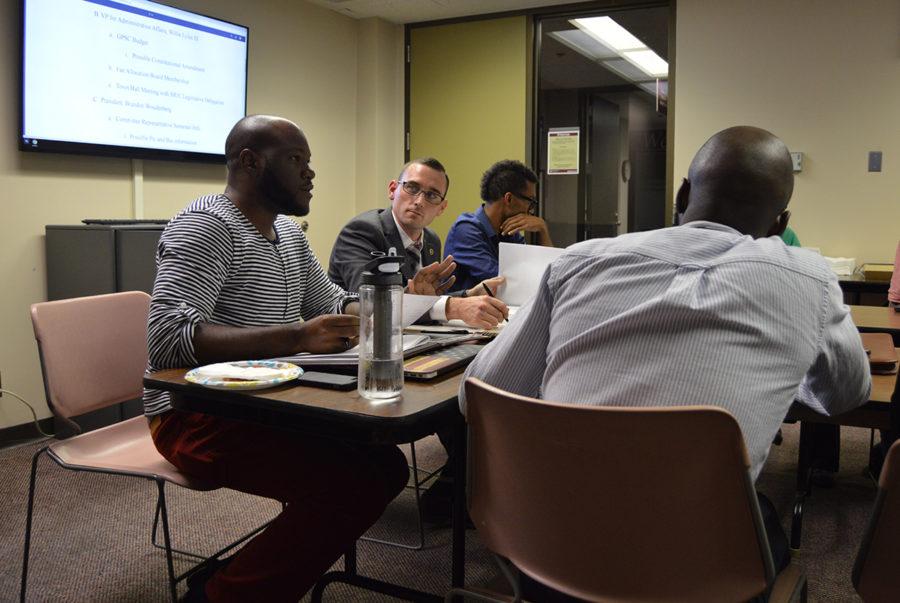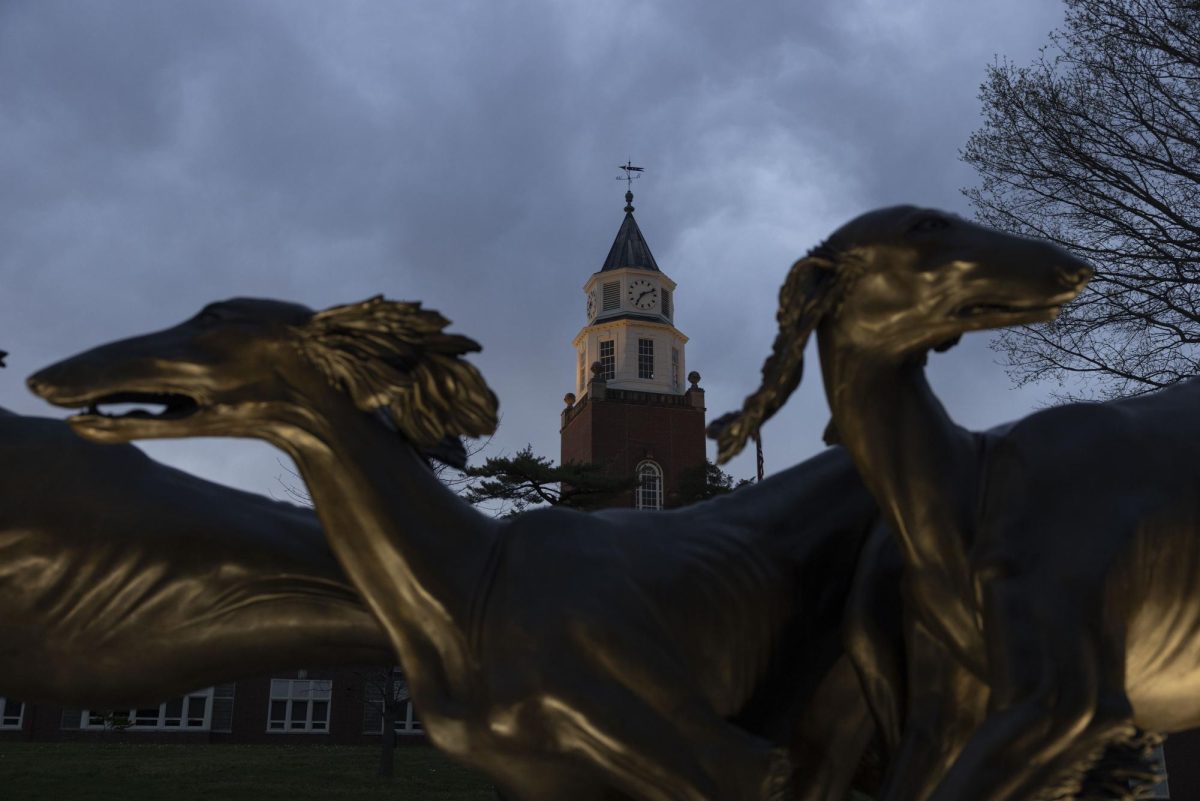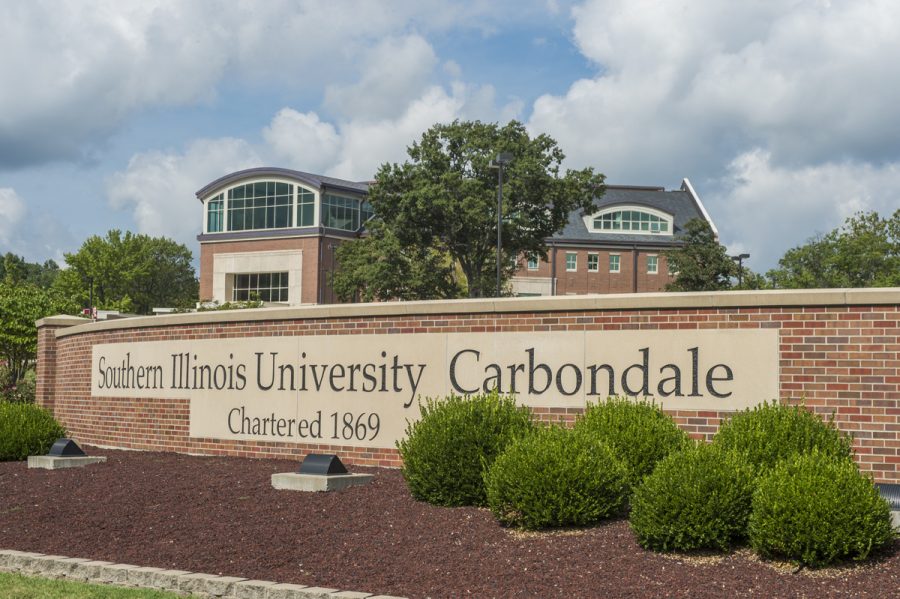GPSC discusses program cuts, university transparency at first meeting
Willie Lyles III, GPSC’s vice president for administrative affairs, addresses the council Tuesday, Sept. 6, 2016, during its first meeting of the year at the Student Center. (Marnie Leonard | @marsuzleo)
September 7, 2016
SIU’s Graduate and Professional Student Council voted unanimously Tuesday to trim officer salaries to save the council $6,400 a year.
A beginning balance for the council’s budget this year amounted to roughly $14,600 less than in 2015, according to data provided by the council. The available funds, which come from tuition fees and reflects student enrollment, fell as students in graduate master’s programs dropped nearly 12 percent.
“Year over year, that means we’re facing a 19 percent reduction,” said Willie Lyles III, the council’s vice president for administrative affairs.
Advertisement
Vice President for Graduate School Affairs Johnathan Flowers detailed the academic program prioritization committee formed at the charge of the university’s provost. This joint task force, composed of a committee formed by GPSC and one formed by the Faculty Senate, is evaluating and ranking all SIU degree programs to aid university administrators with proposed budget cut decisions, according to a May report.
The results of the task force’s evaluations will be used in helping the provost defend SIU programs from budget cuts and possible elimination, Flowers said.
“If a program continues to underperform, the [Illinois Board of Higher Education] will come in and say, ‘OK, you have two months to develop a plan to improve your underperforming metrics or we will shut you down,’” Flowers said. “The university would be able to teach out current students in the program but it would be unable to provide new funds or support to that program.”
MORE: SIU enrollment at lowest point since 1965, data shows
GPSC members went on to discuss a request submitted to the university for more transparency about the allocation of student fees. A report was made by the SIU Board of Trustees but was never shared with the council, GPSC President Brandon Woudenberg said.
“Right now we get half of a half of the student activity fee, and the other half goes to student programming — the comedians, rock concerts, things of that nature,” Woudenberg said. “I can imagine that a lot of graduate students don’t participate in those.”
Also outlined was the new approval process for graduate student Registered Student Organizations. Until the passage of a new amendment last year, all RSOs — even those focused on graduate student needs — went before the Undergraduate Student Council for approval.
Advertisement*
“Graduate RSOs often focus on underrepresented demographics — the Black Graduate Student Association, Women in Law — that kind of thing,” Flowers said. “This will allow us to ensure more voices are heard in GPSC decision making, since GPSC decision making has direct influence on policy at the university level.”
Graduate student organizations will now be approved by the GPSC executive committee before being presented to the body as a whole. The student organizations will also be required to send a representative to the graduate council meetings.
Woudenberg went on to voice the council’s concerns over the university’s response to diversity issues on campus. Under the model proposed by the university, the advisory committee would consist of two representatives from USG, two from GPSC and two from the multicultural center.
The university’s board of trustees, Woudenberg said, did not acknowledge requests to include students on the creation and implementation of the proposed advisory committee.
“It’s not what we wanted, because it’s shortsighted, but it’s what they’ve chosen,” he said.
Woudenberg also laid out the council’s goals for the 2016-2017 school year. One of these goals was a reform to the student affairs department.
“In student affairs we have one actual officer — the vice chancellor of student affairs — who’s an interim officer and arguably not qualified for the position,” Woudenberg said of Lori Stettler.
Woudenberg added that Stettler’s absorption of three different job roles puts “too much power in one place.”
The student affairs department — which oversees a number of university entities, including housing, graduate student affairs, veterans’ affairs and disability services — is currently understaffed by 75 members on top of a 33 percent budget reduction, Flowers said.
Stettler responded to these comments in an email Wednesday. She said although the current Student Affairs situation is not ideal, three assistant deans have taken on additional responsibilities to more evenly distribute the workload.
In consultation with the chancellor, Stettler decided not to fill the dean of students position. Despite this and the 68 other positions that have been merged or held vacant during the past two years, Stettler said she feels the department is able to adequately fulfill its purpose.
Staff writer Marnie Leonard can be reached at mleonard@dailyegyptian.com or on Twitter @marsuzleo.
To stay up to date with all your southern Illinois news, follow the Daily Egyptian on Facebook and Twitter.
Advertisement









